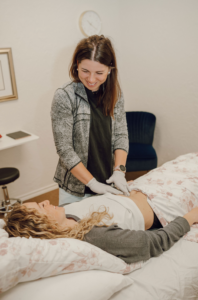Feeling pain rather than fireworks in the bedroom? Here’s what you need to know about pain with intercourse by Dr. Hailey Jackson

 Not quite feeling fireworks in the bedroom, but experiencing pain instead? Here’s what you need to know.
Not quite feeling fireworks in the bedroom, but experiencing pain instead? Here’s what you need to know.
First, I want you to know you are not alone if this is something you experience. Nine out of ten women report experiencing pain with intercourse at some point in their lifetime. It can happen at any point throughout the lifespan too– pre-kids, pregnancy, postpartum, peri or postmenopausal, and there are many things that play a role in creating these symptoms.
Here’s a list of a few things that can be contributing to your symptoms and then we will take a deeper dive on each one– pelvic floor muscle tension, nerve irritation, history of trauma, hormonal deficiencies (hello menopause), lack of lubrication, and/or inadequate of foreplay.
Of course we’re going to start with my favorite, pelvic floor muscle tension. Did you know the pelvic floor muscles were formed the same day as the jaw muscles in utero? Similarly to how tension is held in the jaw, the same can occur in the pelvic floor muscles (and often does without people realizing it). Excess tension in these muscles can be the source of pain alone, but additionally this tension can irritate the nerve(s) that course through these muscles, leading to the sharp, stabby pain that is commonly reported in addition to a laundry list of other symptoms (urinary urgency, constipation, etc). The true source of your tension could arise from various things in the body (ankle instability, hip mobility issues, etc), and once that is addressed the pelvic floor muscle tension should decrease.
Unfortunately, history of trauma can also play a significant role in pain experienced with intercourse as well, as the muscles found within the pelvis is an area of the body that holds tension and stores trauma. I’ve seen numerous patients with pelvic floor dysfunction who experienced a significant amount of trauma/life stressors, which align time-wise with the origin of their symptoms. Addressing the nervous system in addition to pelvic floor muscle tension helps tremendously.
The final three (hormonal deficiencies, inadequate foreplay, and lack of lubrication) can be interconnected. Lower amounts of estrogen (postmenopausal, postpartum/breastfeeding) can lead to vaginal tissue dryness, which can cause discomfort during intercourse. Similarly, inadequate foreplay and consequently inadequate tissue lubrication can yield a similar sensation. Lubrication can help with this, but I encourage you to be picky with lubrication as some lubricants can actually cause more tissue dryness if the osmolality and pH is not suitable for the vaginal canal. A few of my favorites brands include: desert harvest, good clean love, uberlube, slippery stuff, and coconu. Additionally, a moisturizer with hyaluronic acid (good clean love offers this) can help with vaginal tissue dryness. I recommend this often to my postmenopausal and postpartum patients who are not comfortably with topical estrogen. When it comes to foreplay, most sex therapists recommend shooting for 20-30 minutes to allow for adequate lubrication. Remember, women are more like crockpots than microwaves.
Now that we’ve discussed common causes of pain with intercourse, here’s what you need to know:
-
Lubrication helps but is not the end-all-be-all and there can be a muscular or nerve issue that is left unaddressed with simply altering the lubrication situation.
-
Foreplay should be non-negotiable; aim for 20-30 minutes.
-
Kegels often aren’t your answer, as muscle weakness is not likely the root of your issue here.
-
There is help & you don’t have to live with this. I’d love to help you.
If you’re experiencing pain with intercourse and would like to find lasting relief & get back to fireworks in the bedroom, call 903-962-2600 or email hello@txpelvichealth.com to schedule an appointment.
 Instagram: https://www.instagram.com/thepowerfulpelvis/
Instagram: https://www.instagram.com/thepowerfulpelvis/Facebook: https://www.facebook.com/thepowerfulpelvis
Booking: https://app.pteverywhere.com/texaspelvichealth/bookingonlinePtE/category=6467dbd0d672a8cd153492c3













